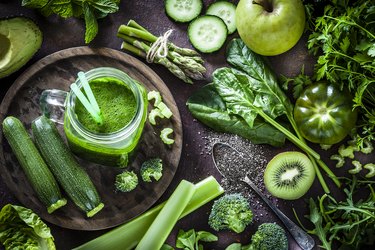
Summer's approach might inspire you to refresh your health habits by doing a cleanse, also known as a detoxification diet. However, during that cleanse, you could experience unpleasant symptoms such as digestive issues, anxiety, irregular heartbeat, dizziness and fatigue during the detox period.
Although detox diets are rumored to cleanse the body of toxins, there is no conclusive evidence that they actually achieve that goal. A December 2014 critical review of the research on detox diets and toxic elimination published in the Journal of Human Nutrition and Dietetics noted that there's preliminary evidence that certain foods, such as coriander, nori and olestra, have detoxification properties, but the majority of these studies were animal studies.
Video of the Day
Video of the Day
Your body naturally eliminates toxins through the lymphatic system, kidneys, digestive system, liver and lungs. Cleanse symptoms are not caused by detoxification but rather a combination of calorie restriction, nutritional deficiency, the withdrawal from sugar, caffeine, alcohol and processed foods, and your body's adjustment to extra fiber intake from fruits and vegetables.
Read more: Just Say "No" to That Detox Diet or Juice Cleanse
What Is a Detox Diet?
Detox diets come in different shapes and sizes. Some consist of several days of fasting, followed by a period of drinking just water and juices. Others consist of eating only unprocessed whole foods such as fruits and vegetables. Some detox diets also focus on "cleaning out" the colon through enemas and taking supplements such as fiber, psyllium husk or activated charcoal.
Some components of cleanses, such as fasting, have been shown to have positive effects on health. An August 2017 scientific review of the research on intermittent fasting regimens and their effects on metabolism published in the Annual Review of Nutrition concluded that the practice could be a promising approach to both weight loss and improving metabolic health.
Digestive Issues During a Cleanse
You may experience digestive issues during the cleanse duration, or detox period. If you are doing a juice or water cleanse, your body is not getting enough fiber to create healthy stools. This can show up as constipation, diarrhea, gas and bloating during the detox period. You might also experience indigestion and heartburn during detox for the same reason. The FDA recommends eating 25 grams per day of fiber on a 2,000-calorie diet.
If you are doing a food cleanse in which you significantly increase your consumption of whole foods, such as fruits and vegetables, your body will require some time to get used to breaking down the increased amount of fiber. The gas, bloating and constipation might go away on their own once the bacteria in your digestive tract have had time to adjust to the increased fiber load.
Read more: Detox Drinks to Lose Weight
Make sure you drink enough water to move stool along in the colon. The amount of water a person should drink daily varies depending on his or her size, activity level, health and where he or she lives. If you need extra help, consult a medical professional to help you determine how much water you should be drinking per day, and drink water whenever you are thirsty or your urine is dark.
Remember, even though most Americans do not get the recommended daily amount of fiber according to the FDA, you can have too much. If you are experiencing gas, bloating or constipation during your cleanse, consider decreasing the amount of fiber you consume. Calculate how much fiber you are taking in, and if it exceeds the recommended daily allowance for your sex and age range, decrease the amount slowly until your symptoms dissipate.
Fatigue and Dizziness During Detox
Those on a water or juice cleanse might experience fatigue and dizziness due to a drop in blood sugar. Glucose, the body's main energy source, comes from the food you eat and drink. Without enough glucose in your blood, your body does not have enough energy to carry out its functions.
However, dehydration could also cause dizziness during detox diets, as the body needs more water than it expels to carry out its regular functions. If you are dehydrated during your cleanse, you might also feel lethargic, woozy, have sunken eyes, headaches, dark-colored urine and an irregular heartbeat. Make sure to drink plenty of water to ward off these cleanse symptoms.
If you do decide to do a cleanse or a detox diet, do so with the guidance of a medical professional, who will be able to structure your diet to diminish negative symptoms such as dizziness during detox.
- National Center for Complementary and Integrative Health: “'Detoxes' and 'Cleanses'”
- Partnership for Environmental Education and Rural Health: “Organ Systems: Detoxification”
- Journal of Human Nutrition and Dietetics: "Detox Diets for Toxin Elimination and Weight Management: A Critical Review of the Evidence"
- U.S. Food and Drug Administration: “Dietary Fiber”
- Hormone Health Network: “Nondiabetic Hypoglycemia”
- Mayo Clinic: "Dehydration: Symptoms & Causes"
- Mayo Clinic: "Dizziness: Symptoms & Causes"
- NCBI: Nutrients: "Water Intake, Water Balance, and the Elusive Daily Water Requirement"
- NCBI: World Journal of Gastroenterology: "Stopping or Reducing Dietary Fiber Intake Reduces Constipation and Its Associated Symptoms"
- Tufts University Health & Nutrition Letter: "Do You Really Need a 'Detox'?"
- Annual Review of Nutrition: "Metabolic Effects of Intermittent Fasting"